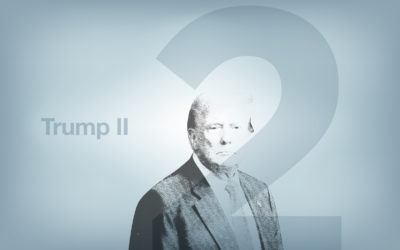 Loading...
Loading...-
This blog was initially published in Slovak by Denník N. You can find it here.
Many political leaders, analysts, and think tankers were reluctant to consider the possibility that Donald Trump could return to the White House. However, since Election Day, much ink has been spilled speculating over which European leader could win over the former and future President. This is merely to prevent the United States from abandoning the old, good, and lazy Europe. Some mention Starmer, others Meloni, and a third group has discovered Tusk. The most desperate look to Orbán. How should the European Union react?
First and foremost, I believe we need a systemic response. We should not be content with the old, tired argument of simply increasing defence spending as a percentage of GDP, as NATO members have been pressured to do. This demand, even during Trump’s first term, was problematic for Europeans. For one, not all EU members are in NATO, nor is Switzerland, nor are many associated countries. Moreover, simply increasing defence budgets doesn’t address many of the EU’s pressing defence issues: neglected production capacities for weapons and ammunition, individual procurement by member states driving up costs, a wide range of often incompatible weapons systems, inadequate transportation infrastructure (weak bridges, narrow roads, short runways), a lack of a comprehensive civil defence system, and the sensitive issue of military deterrence.
However, the unprecedented and ongoing Russian aggression against Ukraine since February 2022, and the clear anti-Western and anti-democratic axis formed by Russia, China, North Korea, and Iran, provide the strongest argument yet for a new approach to European and transatlantic security.
The question today is not primarily about how much money NATO members will spend on defence, but rather how this defence will be organised to be effective and sufficiently deterrent, and thus preventive. However, if necessary, it should also be operationally ready and capable of protecting European and transatlantic interests.
It’s crystal clear that the main challenge for the US is China, a country striving not only for hegemony in the South China Sea but also globally. The US expects the EU, along with the UK and other allies, to act as a ‘junior’ partner and ally in the effort to rein in the Chinese dragon. However, the US also expects the European Union and its European partners to play the role of a ‘senior’ partner in helping Ukraine defend itself. Can anyone reasonably object to such a distribution of responsibilities?
I see only one way to succeed in this global confrontation between authoritarian regimes and the West: to complete the process of European unification into a political union, the keystone of which will be the federalisation of the EU. This means protecting national competencies wherever member states can take on responsibilities themselves or where the principle of subsidiarity dictates. At the same time, this involves entrusting a final set of competencies to the Union at the federal level, in areas where member states cannot cope on their own, or where the Union’s institutions can ensure them more reliably and efficiently. Yes, I speak of foreign and security policy. In these areas, it is necessary to move away as soon as possible from lengthy negotiations towards effective decision-making, that is, voting. And this should be done in such a way that the voice of each member state is taken into account as much as possible.
The process of completing European unification requires suitable external circumstances, as well as a strong, dedicated leader. The circumstances have been ripe for a long time, and a leader is emerging: Friedrich Merz. Germany has developed into Europe’s great economic power since World War II. In recent decades, it has gained new, very valuable, both positive and negative, experiences and skills: with the acceptance of immigrants and their (non-)integration into its country, with the closure of nuclear power plants and its impact on Germany’s energy needs, with the enthusiasm for the Green Deal and its impact on German industry. Germany also has unique experience of the consequences of trying to befriend a bear… especially the Russian one. Germany is a federal country where individual federal states have strong competencies and enjoy the respect and consideration of federal authorities.
International and domestic political circumstances are creating the right space for Europe’s traditional Franco-German engine to work again. Friedrich Merz, in particular, is a hope. The leader of the CDU is seasoned in both economic practice and politics. He knows not only the Bundestag but also the European Parliament. He has been a member of it. He knows the temptation of Eurocrats to take on what is not theirs. But he also knows the reality and the necessity of common, European action. The French President Emanuel Macron, on the other hand, has been in a tight spot between the extreme right and left since he called snap parliamentary elections. A breakthrough in promoting foreign policy and organising European defence could give him renewed energy and a chance to leave behind a worthy legacy.
It is often said that every challenge can also be seen as an opportunity. While this phrase may sometimes sound cliché, recent geopolitical shifts, particularly the ongoing crises in Ukraine and the Middle East, have given it new weight and significance. These challenges present a unique opportunity for us to re-evaluate our priorities and take decisive action. However, to fully capitalise on this opportunity, we must approach it with prudence, courage, and, most importantly, a sense of urgency.
Mikuláš Dzurinda European Union Leadership US Elections

Mikuláš Dzurinda
Donald Trump as a Momentum for Europe
Blog
16 Dec 2024
-
Trump II is upon us, after all. As widely reported in media reactions over the last week, the new President-elect may (or may not, the man is utterly unpredictable) challenge Europe’s current policies on a number of strategically important fronts: from the credibility of America’s security guarantee to Uncle Sam’s continued support for Ukraine’s military efforts; and from the risk of a transatlantic trade war to boosting Europe’s nationalist forces.
Indeed, while polite and at times even warm congratulations have reached Trump from numerous European leaders (including Commission President Ursula von der Leyen), the most hearty and euphoric reactions certainly came from EU-sceptic and nationalist figures such as Hungary’s Prime Minister Viktor Orbán, Italy’s Deputy Prime Minister Matteo Salvini and France’s National Rally leader Marine Le Pen. Their transnational party alliance and European Parliament group ‘Patriots for Europe’ clearly feel the strongest kinship of any European political tendency with Trump’s brand of insurrectional conservatism. And they are openly betting that the tycoon’s return to the White House will boost their political weight within the EU and beyond.
The extent to which that is so will also depend on the willingness and ability of Europe’s centre-right actors to engage fully, systematically and constructively with the new President-elect and the broad constellation of forces shaping his second Administration at all levels. It would be a big mistake if EU-sceptic nationalist leaders remained the sole or even the privileged European interlocutors that President Trump and his people trust and consult to form an opinion on European affairs and define American positions on them. It was largely so during Trump I, and it has unfortunately not changed since. Things can and hopefully will get better under Trump II if relevant actors manage to keep in mind and take advantage of three basic circumstances.
First, unlike many of his long-standing friends amongst Europe’s ‘revolutionary conservatives’, Trump is fundamentally not an ideologue, but a businessman, a transactional leader focused on advancing what he perceives to be America’s national (and often his own personal) interests. This might reduce the breadth of his strategic vistas, but it arguably also deprives them of the rigid fundamentalism typical of more ideological leaders. In other words, despite his professed antipathy for the EU as a ‘foe’ of the new MAGA US, Trump is, rather more than Gorbachev in the 1980s according to Margaret Thatcher’s famous definition, ‘a man we can do business with’. The scope and importance of joint transatlantic challenges is such that a constructive engagement focusing on shared interests, hard bargaining and avoiding any grandstanding about values seems like the way to go.
Second, even if we shift the focus from interests to values, Trump’s Republicans still appear the most obvious partners for Europe’s mainstream conservatives in the current US political scene. Certainly not the perfect partners, and of course not as like-minded partners as Reagan’s or McCain’s Republicans used to be. But probably still closer than the Democrats of the Harris and Ocasio-Cortez generation, dominated by identity politics, given to runaway fiscal profligacy and advancing constitutional proposals (such as abolishing the filibuster and undermining the independence of the Supreme Court) that paradoxically come straight out of the illiberal democrat playbook of some of Trump’s European allies. This is not to downplay the plebiscitarian and illiberal impulses of the MAGA movement, which place it well out of the traditional comfort zone of Euro-Atlantic conservatism. If one looks beyond the often shrill and discomposed language of its promoters, however, Republican proposals from the economy to migration, and from energy to federalism arguably remain more compatible with the traditional policy preferences of Europe’s centre-right than those of their Democratic adversaries.
Third and most importantly, Europe’s political constellation now appears much more amenable to a constructive engagement with Trump’s America than it was under Trump I. Unlike then, governmental partnerships between the mainstream centre-right and more anti-establishment right-wing forces are by now common across the old continent, from the Netherlands to Italy, and from Finland and Sweden to Czechia. Even France is ruled by what de facto amounts to a minority centre-right government partly reliant on the cooperation of the National Rally and its allies in the Assembly. The new European Commission is shaping up to be the most centre-right leaning in decades. While, in the European Parliament, forces to the left of the European People’s Party (EPP) have no majority for the first time since the body’s direct election, a sea change clearly accompanied by growing cooperation between the EPP and the European Conservatives and Reformists (ECR).
All this means that, so to say, the ice between the mainstream centre-right and more ‘Trumpist’-like forces has already been broken in Europe. There is no reason to disbelieve that a similar practice of pragmatic cooperation could be extended to the transatlantic level under Trump II, while remaining conscious of the significant differences between the two sides. No doubt Italy’s Prime Minister and ECR President Georgia Meloni is well positioned to take a leading role towards that outcome. Looking at developments in Germany, she might soon find a valuable ally in Friedrich Merz. Indeed, the likely new German Chancellor seems a rather more conservative and businesslike leader than Angela Merkel, the queen of Europe’s centre-right under Trump I, whose relationship with the American maverick was notoriously dreadful.
Trump II, therefore, will likely be bumpy but need not be the end of the transatlantic relationship that many fear (or hope for). It can also offer the opportunity for a much-needed check-up and recalibration. The willingness of centre-right actors to set aside their reservations and fully partner with the new American Administration may make the difference between the two outcomes.
Federico Ottavio Reho Transatlantic US Elections

Federico Ottavio Reho
Trump II and Europe’s (centre-)right
Blog
15 Nov 2024
-
‘‘Promises made, promises kept’’: President-elect Trump’s governing mantra, expressed in his victory speech, continues to reverberate across the Atlantic. In addition to the White House, Trump’s Republicans will likely control both chambers of the 119th Congress, enabling the administration to cut taxes and wage trade war for American workers; drill more oil and stop climate commitments; keep — and send — undocumented immigrants (and others) out of the country; and tighten the screws on Iran and on China, including through a sweeping legislative agenda already laid out by House Speaker Mike Johnson to further protect sensitive US tech and data from foreign adversaries. New pledges include rescinding President Biden’s guardrails around AI innovation and investing heavily in space tech and manufacturing. Trump may even have the votes to repeal Biden-backed legislation associated with the ‘‘Green New Deal’’, including (parts of) the controversial 2022 Inflation Reduction Act.
These policies may well entail massive new deficit spending and inflationary risks. They may well, too, attract investment and boost US productivity even further. The legacy of Trumpism will largely depend on it.
EU leaders are ostensibly planning for all this: for rule-of-law concerns in the US, breaches to multilateral agreements, less support for Ukraine and new transatlantic tensions. Aligned with the Biden administration’s China policy (which carried on much of Trump 1.0’s), European Commission President von der Leyen has led efforts to strengthen EU economic security and commissioned major reports this year on how the EU should become more competitive and resilient. EU members have largely increased their defence commitments. Reciprocal EU tariffs on US goods are reportedly being prepared. And yet the European Council’s first statement following Trump’s election, in its Budapest declaration this past Friday, was less than inspiring, given the stakes, suggesting not so much urgent action as familiar logjams.
EU leaders are right to fear the tactics of bullying and mis- and dis-information which Trump has wielded to his benefit. They must also reckon with the stark possibility that Trump will re-enter office in January 2025 obsessed not just with a desire for personal retribution but with designs for perpetuating a legitimate Trumpist legacy: in supporting politically aligned causes and candidates domestically as well as in Europe and elsewhere; in securing Vice President-elect Vance in the White House till 2037; and most fundamentally still in the attempt to cement for posterity his reputation not just as the most transformative president since FDR, as The Economist has already touted, but as the greatest president in all of American history.
This will mean, for Trump, harnessing US capital to re-industrialise the US economy and maintain geopolitical supremacy. It will mean making all US efforts to address climate change about adaptation, market efficiency and technological breakthroughs rather than about cutting emissions per se, through regulation or targets. It may mean attempts to transform the global order itself.
Starting in 2015 with his ‘America-First’ campaign, Trump set in motion a new bipartisan consensus on containing China. It may be true that for Trump himself this is less ideological than geographical, based in old mercantilist and even spheres-of-influence paradigms. (The difference here could ultimately come to a head, crucially, over the value of defending Taiwan.) But the trend among US policymakers to think in terms of a new cold war has not diminished. Talk in recent months among Trump advisers of ‘‘AI Manhattan’’ projects suggests a renewed determination on the part of the incoming administration to maintain technological pre-eminence at all costs — whether to privacy, fairness or the environment.
It is in this light that Trump’s potential tariffs should also be seen: the long-term goal being to downgrade the ability of the Chinese government, led by the Chinese Communist Party, to outcompete the US economically and military. To this end, Trump and his team seem all too glad to subvert multilateral principles — and willing to subject American trade partners, and even American consumers themselves, to considerable economic pain.
It is in this light, too, that Trump’s potential Russia policy can be framed. Whatever his personal intuitions regarding Vladimir Putin’s Christian-nationalist revanchism, Trump will be listening to advisers arguing that to win the 21st century, Russia must be pried from its deepening axis with China, Iran and North Korea — and that sanctions against Russia are at once ineffective, in terms of deterrence; costly, by raising energy prices; and detrimental to US power, by incentivising alternatives to dollar-denominated transactions. Whatever Trump’s rationale, ultimately, Europe must prepare to shoulder a heavier political, economic and military load here.
Trump will no doubt also covet the Nobel Peace Prize, an honour granted to Barack Obama in the first year of his first term but for which Trump was later passed over despite having brokered the 2020 Abraham Accords. Alongside promises to stop the fighting in Ukraine, Trump may well redouble efforts — which October 7th 2023 foreclosed for Biden — to stabilise the Middle East with a grand pact including Israeli-Saudi normalisation. Prime Minister Netanyahu and Crown Prince Mohammed bin Salman, both politically attuned to Trump’s appeal, may be amenable to granting Trump such a win in exchange for new security guarantees in consolidating an anti-Iran coalition.
What is the EU to make of all this? The options, admittedly, are not enviable: muddle through and react; further expose Member-State economies to China’s; join the Trump train; or become a real and strategic actor by pushing past longstanding national concerns to create a truly integrated, capable and more federal EU. The first would likely mean ever-declining relative competitiveness. The second involves not just more trade vulnerability but active support — via data transfers to train AI models, for instance — of China’s own super-power ambitions. The third means hard conversations with Washington about the meaning of transatlantic and democratic burden-sharing, including for market access. The fourth means perhaps harder conversations, still, within and between Member States, about the sustainability of their existing social contracts within the framework of the broader European project: whether with regard to defence spending, fiscal stimulus or the potential integration of Member States’ respective energy, banking or procurement systems.
The policies of Trump’s second administration will no doubt have uneven, if dramatic, effects. But he will have one great advantage vis-à-vis the EU, aside from the strategic autonomy the US has already achieved: Trump has a strong and coherent mythology of American purpose which for the foreseeable future looks likely to sustain his agenda politically. He will probably not much care how Europeans square the circle of pooling and deploying the capital needed to cover a myriad of investment shortfalls; these are not his problem, and he may have tailwinds enough to avoid much collateral damage if Europe suffers. Trump has mobilised a resurgent vision of American greatness. The EU must find a new voice, too, and quickly.
Nathan Shepura Transatlantic US Elections

Nathan Shepura
The EU and MAGA: Re-engaging Trump’s mythology of American greatness
Blog
13 Nov 2024
-
Donald Trump’s 2024 victory marks the final chapter of a stunning political comeback by the 45th, and soon to be 47th, President of the United States. Over the course of his nearly 10-year political career, Trump’s political movement, often referred to as Make America Great Again, or MAGA for short, has evolved in subtle but meaningful ways which came to the fore in this latest election cycle.
MAGA originally capitalised on the anxiety and frustrations of economically disenfranchised white voters of the de-industrialised Rust Belt, with a hefty pinch of nativism and xenophobia. While the movement eventually branched out to cover culture war issues such as transgender rights and critical race theory, the impression was always that Trump and his movement sought to cater to that original voter; white, rural, and often lacking a college education. Trump’s 2024 VP pick, JD Vance, seems to confirm this; he came to national attention by writing a memoir about growing up in an Appalachian community racked by substance abuse and generational poverty.
But data around the 2024 election shows this is no longer the case. Trump took 8% and 12% of the Black vote in 2016 and 2020 respectively, and 28% and 32% of the Hispanic vote in the same cycles. In 2024, exit poll data shows Trump maintained his standing among Black voters despite Harris being party African-American herself, and obtained nearly 45% among Latinos (this figure climbs to 54% among Latino men).
In other words, MAGA can no longer be written off as simply a populist, nativist anomaly. The GOP is on track to win both the House and the Senate, which would give Trump at least 2 years of near-absolute power to enact large parts of his admittedly nebulous policy vision. Add to this the fact that Republicans are on track to win the popular vote in a presidential election for the first time since 2004 (and only the second time since 1988), and MAGA is a more viable identity for the Republican Party than at any point since Trump’s appearance on the political scene, in large part thanks to the incorporation of these minority votes.
Obviously, Republicans this cycle benefitted massively from the runaway inflation that has dogged the US economy and the incumbent Democratic administration, just like how Democrats benefitted from the COVID pandemic flaring up on Trump’s watch in 2020. It might also be that as in every other major election globally this year, incumbents lost due to a perceived negative outlook for the country (France and the UK, to name only a couple). Regardless, voters of all backgrounds made the conscious decision to embrace Trump’s MAGA agenda, believing it to be a preferable alternative to Harris and continued Democratic rule.
There is a serious lesson here for the Democrats. Granted, Kamala Harris only had a few short months in the limelight to make herself known to voters. But the problem lies deeper; in fact, Harris did not outperform Biden’s 2020 performance in a single state, and only improved on his margin in 240 counties as of the time of writing this piece – there are 3,144 across the United States. The party will need to rethink what it considers to be an adequate political offering for the most important election in the world moving forward.
For starters, opposition politics do not work; citizens vote for a better tomorrow, not because a candidate promises not to behave to like their opponent. Secondly, the party can no longer take minorities for granted, but acknowledge and concretely incorporate their needs into the party platform; token gestures won’t suffice. This leads into the final point: drop the culture war. Voters don’t choose the President over ideological debates, they prioritise practical issues. This will be especially true come 2026, when Democrats will aim to re-take one or both chambers of Congress. This will demand a laser-like focus on real policy answers to everyday concerns in campaign messaging.
For American democracy at large, this result is actually rather positive: this convincing, broad-based victory for Trump definitively shows there is no secret conspiracy to keep him out of power, as he has continually alleged since refusing to concede defeat in the 2020 election. Without any reason to complain about the state of American democracy, he will hopefully focus his efforts on delivering economic growth as opposed to tearing down US democratic institutions, which he has alluded to multiple times.
These themes were central in driving voter behaviour this year; exit polls reveal 34% of voters said democracy mattered most to their votes, and 31% said the economy was their top concern. Let’s hope the first group takes its civil society guardrail role seriously, and the second group keeps the administration focused on what got them elected in the first place.
Theo Larue Elections Transatlantic US Elections

Theo Larue
What MAGA 2.0 Means for America
Blog
06 Nov 2024
-
The long wait for the election result is over: Donald Trump has won. Although polls showed a historically tight contest, many Trump supporters kept their preference private, leading to a clear result on Election Day, including in the swing states. Despite an aggressive campaign, marked by hostility, insults, and criminal charges, Trump emerged victorious. The reasons are varied, but the principal one is that a significant part of the American public perceives the country’s state as dismal, seeing Trump as the only candidate who can provide change.
Americans demand solutions on inflation, national security, border control, and crime—areas where Trump did offer understandable responses. Kamala Harris’s message, by contrast, appeared defensive and lacked clear vision. Furthermore, the Democratic Party’s shift to the left, with an increased focus on identity politics, did not resonate with voters looking for tangible support for the average citizen.
While the election was undoubtedly dramatic and the arrival of a new US administration signals upheaval, Europe’s core strategy and objectives remain unchanged, even with Trump in the White House.
Building European Defence: Empowering Europe and Easing Cooperation with Trump
The stakes for Europe are higher than ever, especially with the ongoing war in Ukraine. A lack of a Western response to North Korean troops arriving in Ukraine sends a signal of indifference. Although Washington remains divided on whether war in Ukraine is connected to Asian security challenges, it’s clear that Europe must step up as diminishing American support for Ukraine increasingly becomes a reality.
The US and Europe should no longer be discussing the conditions under which a third world war might start, as the scenarios of the 1940s are unlikely to occur on a global scale – the nature of conflicts has evolved. What we are witnessing today is a global proxy war that has already begun between democratic and authoritarian regimes. It manifests with varying intensity by region, and is primarily about global leadership.
As a consequence, a successful military outcome for Ukraine is crucial, while Europe must build its own defence capabilities and nurture a culture of civil defence. Domestic politics in France and Germany’s reluctance to fully implement its Zeitenwende for defence complicates progress on this matter. Poland and the Nordic countries, among others, may need to step into greater leadership roles.
An Uncertain Global Trade Outlook Makes Boosting Europe’s Competitiveness Essential
European political volatility is the reflection of a decade of economic stagnation. Facing demographic, economic, and security challenges, Europe needs growth. The bloc’s ability to address these various hurdles will be in large part determined by its ability to reform its productivity model amidst a rapidly changing global landscape.
For the economy, as in many areas, interactions with the US will become transactional. Europeans should get used to it, and learn not to feel provoked by the Trump administration’s inevitable use of a “take it or leave it” bargaining strategy.
Transatlantic Relations Remain Central, No Matter Who Leads the US
The United States is at a domestic turning point, but Kamala Harris’s election would not have eliminated the polarisation there. Europe must prepare for a turbulent decade as political shifts in the United States continue.
Despite everything, the US and Europe remain each other’s closest allies. Together, they can still shape global developments. Europe should engage openly with the new Trump administration, striving to rebuild constructive relations, just as it would with any incoming administration.
The US has a remarkable history: in just a few hundred years, it grew from a distant colony to a global leader of Western culture, driving substantial progress globally. At the same time, the US, as a young nation, is likely to face intense self-examination in the coming years, with unavoidable impacts on Europe.
As Polish Prime Minister Donald Tusk tweeted recently: “Some claim that Europe’s future depends on the American elections, but it depends, first and foremost, on us. Europe must finally believe in its own strength.” Often called the “old continent,” Europe is still young in its efforts to unify. Many political entities are forged by trial, and the EU must answer the call of history. It is time for the bloc to step into full adulthood; the protective big brother for Europe is not there anymore.
Tomi Huhtanen Elections Leadership Transatlantic US Elections

Tomi Huhtanen
The US Elections Change Everything and Nothing for Europe
Blog
06 Nov 2024


